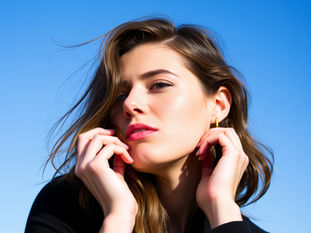
Apple Cider Vinegar for Hair: Does It Help or Hurt?
Nov 17, 2025
3 min read

Have you ever tried a home remedy that sounded amazing… until you weren’t sure if it helped or made things worse? Apple cider vinegar (ACV) is one of those popular “miracle” hair treatments you see all over the internet. Some people swear it makes their hair shiny and smooth. Others say it dries out their scalp or causes irritation.
So, what’s the truth? Let’s break it down in a simple way.
Why People Use Apple Cider Vinegar on Hair
ACV has been used for years in beauty routines. Many people in San Jose love natural products, so it’s no surprise ACV is a common go-to. Here’s what it’s known for:
Shine: Some say it helps hair look bright and glossy.
pH balance: ACV is acidic, which may help balance a scalp that feels too oily.
Product buildup: It may help remove leftover hair spray, gel, or conditioner.
Smoother strands: Some people notice their hair feels softer after using it.
These benefits sound great, but ACV isn’t perfect for everyone.
How Apple Cider Vinegar Can Help
For some people, ACV can be a simple boost to their hair routine:
It may calm a flaky scalp if dandruff is caused by excess oil.
It may reduce frizz, especially in humid places like the South Bay.
It may clean the scalp when products start to build up.
If your hair gets greasy fast or feels coated, ACV might give some relief.
How Apple Cider Vinegar Can Hurt
Even natural products can cause problems. ACV is very acidic, and using too much can irritate your scalp.
Here’s how it can cause trouble:
Burning or stinging scalp
Extra dryness
Redness or itching
Brittle hair that breaks easily
People with sensitive skin, color-treated hair, or a history of scalp issues may react strongly to ACV.
If you feel burning, stop using it right away.
How to Safely Use ACV (If You Want to Try It)
If you still want to give ACV a chance, here’s the safest way:
Always dilute it.Mix 1–2 tablespoons of ACV with 1 cup of water.
Use it only once a week.Overuse can cause dryness.
Avoid your eyes.ACV will sting!
Do a patch test first.Try a small amount on your wrist or behind your ear.
If your scalp starts to itch, burn, or turn red, rinse it out and stop using it.
When Apple Cider Vinegar Is NOT a Good Idea
Skip ACV if you have:
A sensitive or damaged scalp
Eczema or psoriasis
Open cuts or sores
Very dry or color-treated hair
Recent chemical treatments (bleach, perms, relaxers)
These conditions need gentle care—not harsh acids.
The Bottom Line: Help or Hurt?
Apple cider vinegar can be helpful for some, and harmful for others. There’s no one answer that works for every head of hair. If your scalp is healthy and your hair is strong, ACV may bring some benefits. But if your scalp is already irritated or your hair feels fragile, ACV may make things worse.
If you’re unsure, it’s always best to talk with a hair and scalp expert.
Need Real Answers About Your Scalp or Hair?
At New Look Institute, we are experts on the health of your hair and scalp. We understand that every person’s hair needs are unique, and we use advanced trichology principles to help you find what truly works for you—not just what’s trending online. If you’re struggling with scalp irritation, hair thinning, or simply want professional guidance, contact us today to schedule your complimentary consultation. Let’s help you achieve a healthier, happier head of hair.






